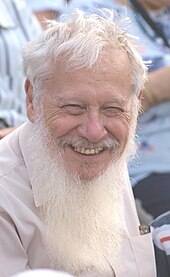Robert Aumann
Appearance

Robert Aumann (born 1930, in Frankfurt,Germany) is an Israeli mathematician, Professor Emeritus at the Hebrew University of Jerusalem, who won the 2005 Nobel Memorial Prize in Economic Sciences.
Quotes
[edit]- All these cries for peace we hear in Israel, especially from our side, do not bring peace any closer -- they only push it away. If you chase peace it only eludes you. That's not game theory; that's history.
- From an article on Israel Hayom
- We can trust only ourselves. The president of the United States has to look out for U.S. interests -- that is what he was elected to do. He does not have to look out for Israel's interests, nor do I expect him to. The bottom line is that Obama is president of the United States -- not the world -- so when it comes to Israel's interests I trust the prime minister's discretion.
- From an article on Israel Hayom
- The world aligns itself with those who are strong, even if they are the embodiment of evil. That is why [Prime Minister Benjamin] Netanyahu's insistence on addressing Congress in an effort to prevent a deal between the United States and Iran is vital...
- From an article on Israel Hayom
- Capitulation, sycophancy, and cowardice will only undermine us... Sometimes, you have to courageously follow your own path and not try to curry favor with anyone.
- From an article on Israel Hayom
- It turns out that the Romans were champs in making peace. Their motto was that if you want to make peace, you need to prepare for war. They knew game theory.
- Quoted by Elad Benari in The Frantic Desire for Peace Only Brings War. [1]
- The strong equilibrium point f just described is one of "unrelenting ferocity" against offenders. It exhibits a zeal for meting out justice that is entirely oblivious to the sometimes dire consequences to oneself or to the other faitheful——i.e., those who have not deviated.
- "Acceptable Points in General Cooperative n-Person Games," in Contributions to the Theory of Games IV, Annals of Mathematics Study 40, edited by A. W. Tucker and R. D. Luce, Princeton University Press, 1959, pp. 287-324.
- "Interactive Decision Theory" would perhaps be a more descriptive name for the discipline usually called Game Theory.
- Robert Aumann (2000) Collected Papers: Vol. 1. p. 47
- I think game theory creates ideas that are important in solving and approaching conflict in general.
- Aumann in: "Game theorists share Nobel prize" bbc.co.uk. Monday, 10 October 2005
- “Torah study is an intellectual pursuit, and honoring this ultimate value transfers to other pursuits as well, Jewish homes are full of books while other homes may or may not be. Jewish homes have overflowing bookshelves. Throughout the generations we have given great honor to this intellectual pursuit…Torah study makes the nation and its people of the finest and highest quality.”
- Aumann said to Israel’s Army Radio. "Israel Today" israeltoday.co.il. December 03, 2013
War and peace (2005)
[edit]Robert J. Aumann (2005) WAR AND PEACE Prize Lecture1, December 8, 2005
- I would like to suggest that we should perhaps change direction in our efforts to bring about world peace. Up to now all the effort has been put into resolving specific conflicts: India–Pakistan, North–South Ireland, various African wars, Balkan wars, Russia–Chechnya, Israel–Arab, etc., etc. I’d like to suggest that we should shift emphasis and study war in general.
- p. 1
- War has been with us ever since the dawn of civilization. Nothing has been more constant in history than war.
- p. 1
- A person’s behavior is rational if it is in his best interests, given his information.
- p. 2
- The theory of repeated games is able to account for phenomena such as altruism, cooperation, trust, loyalty, revenge, threats (self-destructive or otherwise) – phenomena that may at first seem irrational – in terms of the “selfish” utility-maximizing paradigm of game theory and neoclassical economics.
- p. 3
- The players in a game are said to be in strategic equilibrium (or simply equilibrium) when their play is mutually optimal: when the actions and plans of each player are rational in the given strategic environment – i.e., when each knows the actions and plans of the others.
- p. 4
- Repetition acts as an enforcement mechanism: It makes cooperation achievable when it is not achievable in the one-shot game, even when one replaces strategic equilibrium as the criterion for achievability by the more stringent requirement of perfect equilibrium.
- p. 7
About Aumann
[edit]- In many real-world situations, cooperation may be easier to sustain in a long-term relationship than in a single encounter. Analyses of short-run games are, thus, often too restrictive. Robert Aumann was the first to conduct a full-fledged formal analysis of so-called infinitely repeated games. His research identified exactly what outcomes can be upheld over time in long-run relations.
- "Nobel Prize 2005 Press Release" 10 October 2005
- He advised the audience to remember the Romans, and the fact that as "disagreeable" as they were, the Roman Empire ruled in peace for 400 years.
- From an article on Israel Hayom

